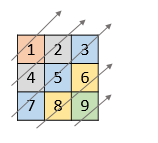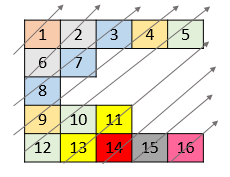1424. Diagonal Traverse II
Description
Given a 2D integer array nums, return all elements of nums in diagonal order as shown in the below images.
Example 1:

Input: nums = [[1,2,3],[4,5,6],[7,8,9]] Output: [1,4,2,7,5,3,8,6,9]
Example 2:

Input: nums = [[1,2,3,4,5],[6,7],[8],[9,10,11],[12,13,14,15,16]] Output: [1,6,2,8,7,3,9,4,12,10,5,13,11,14,15,16]
Constraints:
1 <= nums.length <= 1051 <= nums[i].length <= 1051 <= sum(nums[i].length) <= 1051 <= nums[i][j] <= 105
Solutions
Solution: Array
- Time complexity: O(n)
- Space complexity: O(n)
JavaScript
js
/**
* @param {number[][]} nums
* @return {number[]}
*/
const findDiagonalOrder = function (nums) {
const diagonalOrder = [];
for (const [row, num] of nums.entries()) {
for (const [col, value] of num.entries()) {
const order = row + col;
const diagonal = diagonalOrder[order];
diagonal ? diagonal.unshift(value) : (diagonalOrder[order] = [value]);
}
}
return diagonalOrder.flat();
};